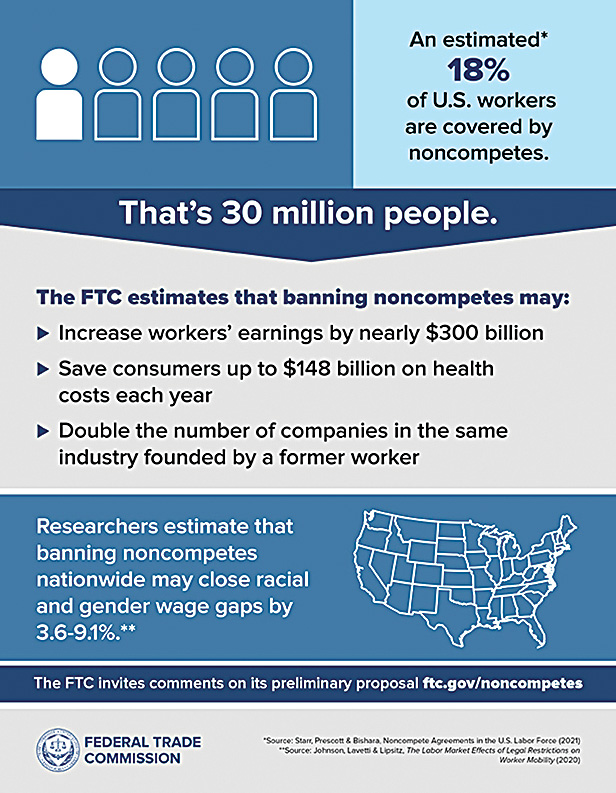News April 17, 2024
FTC Set To Decide Fate of Noncompete Agreements on April 23
This Q&A primer fills you in on the controversial proposal that could see the contract clauses widely outlawed in the United States.
Know that old saying about not talking religion or politics?
Might want to throw noncompete agreements into that category, too.

The contract clauses have been a flashpoint in the promotional products industry and business world more broadly, especially so since January 2023 when the Federal Trade Commission (FTC) announced a proposed rule that would, if implemented as initially envisioned, prohibit companies from placing noncompetes on workers under most circumstances.
Now, things are coming to a head.
On Tuesday, April 23, the FTC is holding a special meeting where a vote on whether or not to issue a final rule on noncompetes is likely to occur. Here’s a breakdown of where things stand, what could be coming and what it means for promo.
Q: What’s happening April 23rd?
A: Short answer: An FTC vote on whether or not to implement some level of restriction on noncompete agreements in the United States is probable.
Longer answer: The FTC will hold an Open Commission Meeting. There, the commission will decide to authorize public disclosure of the proposed final rule on noncompetes. It’s possible that the FTC will refrain from making the rule public, which could at least temporarily prevent a ban from moving forward. Still, that’s not likely. Instead, the FTC is in line to make the rule public. Chair Lina Khan will then offer remarks, and staff will present on the rule and its particulars. After that, the FTC would vote to make the rule official or not – what’s known as issuing a final rule.
What's a Noncompete? In effect, a noncompete clause prohibits one party (usually a worker) from taking another job or starting a business in a similar profession and/or region that competes against another party (usually an employer), often for a set period of time.
Q: Is it likely the FTC will approve the final rule?
A: Our crystal ball is in the shop, but the smart money is on “yes.” Khan has heavily criticized noncompetes, saying they’re a widespread and often exploitative practice that suppresses wages, hampers innovation, and blocks would-be entrepreneurs from starting businesses. The Biden administration has sought to portray itself as union- and worker-friendly, and a noncompete prohibition aligns with that effort. Plus, FTC staffers just spent a year working on the final rule and a public vote meeting has been scheduled – probably not for nothing.

Infographic courtesy of the FTC.
Q: What is the FTC proposing?
A: Good question. The precise wording of the final rule has yet to be publicly shared. Still, the notice of proposed rulemaking the FTC issued in early 2023 gives insight into where the commission’s head is at, so to speak.
That proposed rule indicated that the FTC’s initial findings support outlawing employers from inserting noncompete clauses into contracts with essentially all workers – and from in any way representing that a worker is subject to a noncompete.
The notice indicated “workers” are employees, including senior-level executives, as well as independent contractors, consultants, interns and volunteers. Certain legal analysts say that the rule could apply even to partnership and membership agreements among individuals, meaning standard noncompetition clauses within LLC and partnership agreements could be affected.
Furthermore, if the prohibition goes on the books as outlined back in January 2023, employers would have to rescind noncompete clauses with current and former workers within 180 days of the rule taking effect. After rescinding, employers would have another 45 days to inform workers/former workers, through a specific communication to each, that the clause has been abolished.
There could be some exceptions to the ban. Noncompetes would, the proposed rule indicated, still be allowed in the sales of businesses, but with limited application to individuals who owned at least 25% of the company.
Some attorneys have asserted that FTC jurisdiction here does not apply to banks, federal credit unions, air carriers, common carriers, meatpackers and poultry dealers, meaning the noncompete ban could be unenforceable among such entities. Nonprofits could be exempt too, according to certain legal experts.
An FTC-proposed ban on noncompetes is sharply dividing opinion in the #promoproducts industry. This special report has everything you need to know about the proposal and how industry pros are reacting to it.https://t.co/zU00xcMuWJ@ASI_MBell @Tim_Andrews_ASI @asicentral
— Chris Ruvo (@ChrisR_ASI) February 17, 2023
Q: How will a ban impact promotional product companies?
A: Again, definitive effects can only be determined after the particulars of the final rule are revealed. Suffice to say though that if the FTC decides to enact something like the sweeping ban it discussed in its proposed rulemaking, then promo companies would generally not be able to insert noncompete clauses into contracts and would have to rescind ones they have in place. Failure to do so would run a company afoul of the law.
Beyond that, potential effects become more speculative. Some pro-ban proponents in promo and other industries think the prohibition will better protect workers’ right to earn a livelihood, while improving upward mobility and compensation, and fostering entrepreneurship. Others decry a ban as damaging to businesses, asserting it could hurt hiring, reduce profitability, drag down efficiency, and open owners/companies to being exploited by unscrupulous employees.
“We strongly oppose the proposal because noncompetes serve vital business and employee interests and because the FTC lacks legal authority to issue the proposed rule.” Letter from the U.S. Chamber of Commerce and more than 280 organizations across industries.
Q: Would the ban cover nondisclosure agreements and non-solicitation agreements?
A: Not as envisioned in the preliminary proposed rule first brought to the public in 2023. Provided the FTC doesn’t insert language into the final rule that prohibits or limits nondisclosure or non-solicitation agreements, companies could continue to be on solid ground using them, barring a ban elsewhere or down the line, attorneys have said.
Nondisclosures don’t prevent a worker from seeking employment with a competitor or starting a competing business, but they can act as a binding contract that prohibits the sharing/use of sensitive information, such as trade secrets and proprietary processes. In effect, non-solicitations prevent a worker from soliciting certain or even all of a company’s customers/clients if the worker departs from the company.
Q: I want to tell the FTC what I think about noncompetes. Can I?
A: Nope – at least not in any official capacity that the commission will consider at this point. The public comment period on the proposed rule closed in April 2023. The FTC received more than 26,000 comments. The commission and its staffers say they extensively reviewed comments and took them into consideration in formulating the proposed final rule on noncompetes.
Q: Could this all end up in the courts?
A: Good chance of it. If the FTC votes to enact a widespread ban or at least levels of restriction that businesses and associations that support them find onerous, then legal challenges are a safe bet. Anticipate that the courtroom challengers will request a temporary injunction to prevent the rule from being implemented until the case(s) is decided. Were that temporary injunction to be granted, it would prevent the rule from taking effect for a period of time.
“Particularly where the commission’s authority to implement any such noncompete ban is in dispute, it is likely that whatever form of noncompete ban the commission may vote to adopt will be promptly challenged in litigation,” note attorneys from the firm Morrison Foerster.
